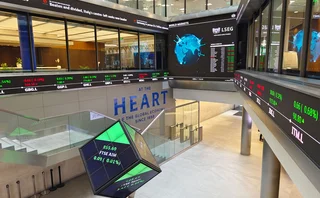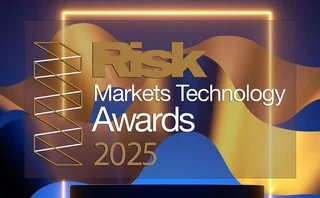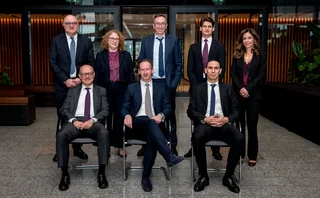
Clearing house innovation of the year: Eurex Clearing
Risk Awards 2019: CCP’s incentive scheme takes on LCH to capitalise on Brexit uncertainty

Eurex and LCH reacted in different ways to the collapse of their parent companies’ planned merger. For LCH, the deal’s failure in the spring of 2017 passed with barely an afterthought. For futures giant Eurex, the loss of a potential tie-up with the home of more than 90% of the world’s cleared interest rate swaps sparked a bout of introspection – one that resulted in the Frankfurt CCP throwing down the gauntlet to its would-be bedfellow, and redoubling its efforts to compete in OTC clearing via a very LCH-like dealer incentive programme.
On paper, the logic was clear: EU-domiciled banks and clients currently clearing at LCH faced an uncertain regulatory regime post-Brexit. They also faced political pressure to repatriate jobs and business onshore. Clearing members responsible for euro-denominated trades between EU counterparties at LCH faced the prospect of having to find a new home for some £38 trillion ($49 trillion) worth of positions in short order. Alternatives to London were few, giving Eurex its best shot at competing in cleared rates since the aftermath of the crisis.
Two obvious problems stood in the way: the first was the higher cost for banks to clear swaps at Eurex versus LCH over the lifetime of a trade. A wide and sometimes volatile price basis in swaps cleared in Frankfurt versus the same instruments cleared in London was apparent across all tenors. The differential stemmed from the directionality of Eurex’s book, which is dominated by fixed-rate payer swaps. The basis acts as an incentive for dealers to hedge client positions at LCH, and thus fund two separate initial margin requirements.
But the more fundamental problem was the higher upfront cost of routing a trade to Eurex. A relative lack of competitive quotes from FCMs offering client clearing at Eurex drove bid-offer spreads wider versus LCH, particularly at the longer end of the curve.
“Everybody talks about the basis – but actually, spreads being wider were the bigger inhibitor for attracting client clearing business. We had to get those tighter by bringing more dealers on board, and securing more active flows. We had a strategic opportunity to win more business, but we had to fix that before we could capitalise,” says Matthias Graulich, member of the executive board of Eurex Clearing.
Eurex went all out in an attempt to beat LCH at its own game. The clearer drew up an ambitious incentive scheme, which, like LCH’s SwapClear, would offer rebates to dealers using the service.
In the space of less than 12 months, the partnership programme has blown open the doors to competition. From a tiny base, average daily cleared volumes in OTC interest rate derivatives jumped 15-fold to €69 billion ($79 billion) in November – up from €4.6 billion a year previously. Notional outstanding stood at €10.5 trillion at the end of the month, compared with €1.8 trillion versus the same period a year ago. The improvement is enough to give Eurex a claimed market share of 15% in forward rate agreements (FRAs); 1% in overnight index swaps (OIS) and 3% in rate swaps by average daily volume.
The scheme paid out its first share of spoils to members in October, when the €2.3 million ($2.6 million) revenue sharing threshold was exceeded. A plan to extend the offering to repo trades is already underway.
For Eurex, the path to winning more buy-side rates business lay in FRAs – short-dated contracts primarily used by dealers to even-out date mismatches or odd exposures in their swap books – a corner of the swaps market dominated by interbank trades. Hitherto, all FRA trades conducted through reset auctions at the market’s largest brokers, Nex and TP-Icap – used by dealers to balance up cashflow dates on trades – were routed straight to LCH for clearing. Dealers were given no choice over the venue.
“We spent a lot of time working with those guys to allow for the creation of an alternative,” says Graulich. “That’s worked very well. On peak days, we see a 60% market share of FRA trades. It shows the market’s commitment to building a viable alternative CCP.”
Both parties stood to gain from the arrangement. For the banks, the rebates were free money for trades that are mandatorily cleared, but, since they are short-dated, offer relatively small netting benefits when matched up with a dealer’s house book at SwapClear. In return, Eurex gained the ear of the dealers, getting them used to interacting with its systems and personnel on a daily basis. Banks were also given the chance to pull power players into the fold with the promise of a seat on the incentive programme’s advisory board.
Under the terms of the deal, the top five banks by volume in the partnership programme as of end-March 2018 – BNP Paribas, Deutsche Bank, Commerzbank, JP Morgan and LBBW – secured two years’ governance rights, giving them a voice in shaping the future of the service. Since then, larger US and UK clearers – including Bank of America Merrill Lynch, Barclays, HSBC and Morgan Stanley – have become larger-volume players.
Natural fixed-rate receivers such as insurers and LDI funds stood to benefit from the basis, of course, and many moved to capitalise. BNP helped one asset manager move a portfolio with DV01 of some €15 million from LCH to Eurex, which it hedged using a combination of CCP switch trades and finding a counterparty that wanted to backload pay-fixed positions into LCH.
Once Eurex had two-way flow, the result was a rapid narrowing of the basis. “We have a nice balance of payers and receivers, which means the basis has come in,” says Graulich. And with more dealers actively quoting on cleared prices at Eurex, spreads came in too, with prices on all tenors now in line with those for LCH euro swaps,” he adds.
By early October, the basis between 10-year euro swaps at Eurex and SwapClear was just 0.1 basis points, down from a high of 2.5bp in early 2017. By that point, the instruments were quoted on Tradeweb with the same bid-offer spread, regardless of whether they were cleared in London or Frankfurt.
But spread and basis narrowing didn’t automatically open the floodgates. Eurex has spent thousands of hours on a vast face-to-face lobbying effort to woo dealers, too. Several FCMs characterise Eurex’s responsiveness and willingness to engage with dealer and client feedback as unrecognisable from several years ago, when its hopes of competing with LCH in rates and Ice in CDS clearing looked remote.
In July, when the bourse held a meeting with a group of banks to highlight the merits of the incentive scheme, many were unaware of the extent to which the basis had already contracted under the weight of more balanced flows, says Graulich. Following that meeting, Eurex claimed an end-July market share of 26% in FRAs and 5% in rate swaps by ADV.
A total of 61 members have now onboarded for rates clearing, with a further six in the process of signing. Those firms represent some 148 clients, with a further 40 – including names such as BlueCrest, Brevan Howard and Capula Global – understood to be joining.
Compared with SwapClear, Eurex numbers are still small. But while the bourse acknowledges it is unlikely to get to LCH’s 750-odd members any time soon, it is understood to be targeting an over-the-counter clearing membership of around half that number in the medium term.
Eurex has had to grow up fast in its role as a CCP capable of handling large volumes of mature swaps positions. For example, the clearer has already agreed to make changes to its liquidity risk adjustment for large positions increases. That is a response to dealer concern that margin amounts for outsize positions are sometimes as much as 40% lower at Eurex than at SwapClear.
Some FCMs couch the issue as a function of Eurex’s relative lack of experience in handling big rates positions; Thomas Laux, Eurex Clearing’s chief risk officer, chooses to see the positives.
“We see this kind of feedback as a very good signal, even if it means we have to make changes. It shows how seriously dealers care about these kind of matters. It shows they take us very seriously as a valid alternative to LCH. These are the kind of questions you get when someone really drills into your margin methodology, and expends a lot of time and effort. It shows the partnership model is working. In the past, we mainly discussed with members small to medium-sized exposures. We felt that dealers were not overly comfortable to discuss positions of the order of €20 million or €30 million DV01 with us. Now that has changed.”
Of course, none of the FCMs that spoke to Risk.net would admit to being in the scheme purely for the money. But if sparking banks’ competitive instincts was the aim, the programme can be judged a resounding success. In fact, argues one proponent, Eurex’s approach could be considered more competitive than LCH’s; under the revenue-sharing agreement between the London Stock Exchange and the OTCDerivNet group of banks that founded SwapClear, revenues between dealer members are split evenly, rather than as a proportion of business they clear. All LSE scheme members are banks, whereas Eurex’s scheme is open to market makers and buy-side firms.
Firms gain rebates based on the amount of business they do at Eurex in proportion to other firms. On an FRA, for instance, the rebate equates to roughly 50 cents per €1 million of notional cleared; on a 10-year interest rate swap, that jumps to €8 per €1 million of notional.
Banks can secure a multiplier of up to three times this amount based on other factors: offering direct access models for client clearing; the number of clients they offer clearing to; facilitating cross-margining with Eurex futures; and quality of quotes. The deal is structured with break clauses, allowing the CCP to revise rebate levels further down the line.
One question remains: given the scheme’s rapid success, why hasn’t Eurex tried something like this before? In fact, it did. Back in 2012, the CCP struck a tentative deal with a group of banks for a private, closed revenue-sharing model – something closer in spirit perhaps to OTCDerivNet’s model – but it failed to take off, and, with the first of two mega-merger bids taking priority (this time NYSE Euronext), was shelved.
Whether the momentum continues, only time will tell. But with 60% of cleared business coming from UK-domiciled clients, the CCP is confident future success is not dependent on a hard deal Brexit.
Only users who have a paid subscription or are part of a corporate subscription are able to print or copy content.
To access these options, along with all other subscription benefits, please contact info@risk.net or view our subscription options here: http://subscriptions.risk.net/subscribe
You are currently unable to print this content. Please contact info@risk.net to find out more.
You are currently unable to copy this content. Please contact info@risk.net to find out more.
Copyright Infopro Digital Limited. All rights reserved.
As outlined in our terms and conditions, https://www.infopro-digital.com/terms-and-conditions/subscriptions/ (point 2.4), printing is limited to a single copy.
If you would like to purchase additional rights please email info@risk.net
Copyright Infopro Digital Limited. All rights reserved.
You may share this content using our article tools. As outlined in our terms and conditions, https://www.infopro-digital.com/terms-and-conditions/subscriptions/ (clause 2.4), an Authorised User may only make one copy of the materials for their own personal use. You must also comply with the restrictions in clause 2.5.
If you would like to purchase additional rights please email info@risk.net
More on Awards
Clearing house of the year: LCH
Risk Awards 2025: LCH outshines rivals in its commitment to innovation and co-operation with clearing members
Best use of machine learning/AI: CompatibL
CompatibL’s groundbreaking use of LLMs for automated trade entry earned the Best use of machine learning/AI award at the 2025 Risk Markets Technology Awards, redefining speed and reliability in what-if analytics
Markets Technology Awards 2025 winners’ review
Vendors jockeying for position in this year’s MTAs, as banks and regulators take aim at counterparty blind spots
Equity derivatives house of the year: Bank of America
Risk Awards 2025: Bank gains plaudits – and profits – with enhanced product range, including new variants of short-vol structures and equity dispersion
Law firm of the year: Linklaters
Risk Awards 2025: Law firm’s work helped buttress markets for credit derivatives, clearing and digital assets
Derivatives house of the year: UBS
Risk Awards 2025: Mega-merger expected to add $1 billion to markets revenues, via 30 integration projects
Interest rate derivatives house of the year: JP Morgan
Risk Awards 2025: Steepener hedges and Spire novations helped clients navigate shifting rates regime
Currency derivatives house of the year: UBS
Risk Awards 2025: Access to wealth management client base helped Swiss bank to recycle volatility and provide accurate pricing for a range of FX structures







